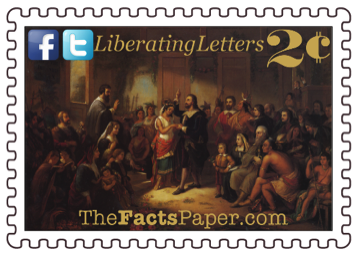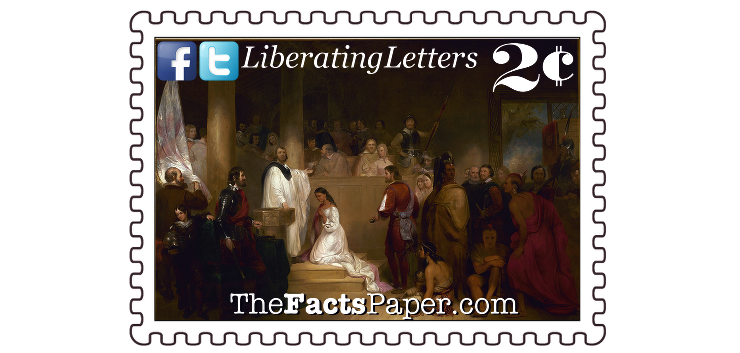April 5, 2017
Dear Liberty,
According to today’s progressive history textbooks, the white man only came to America to suppress and oppress the Native American and then the African American. What they conveniently leave out of the conversation is people like Rev. Alexander Whitaker. Not much is known about him, but what we do know is momentous.
Born around 1585 in Cambridge, England, Whitaker was the eldest son of Dr. William A. Whitaker and his first wife. A prominent Protestant scholar, Willam was a Master of St. John’s College in Cambridge. Whitaker somewhat followed in his father’s footsteps, becoming a clergyman in Northern England after receiving his B.A. from Trinity College in 1604. He shepherded a parish in Yorkshire until he felt called to travel to the Americas.
While some white men coming to America saw the Indians as inferior, Whitaker believed, “One God created us: They have reasonable souls and intellectual faculties as well as we. We all have Adam for our common parent.” Therefore, his desire was not only to minister to those Englishmen settling in the New World, he also wished to preach the Gospel to the natives already inhabiting the land. (see Jamestown: A City Upon A Hill and 'Higher' Education)
Upon his departure from England, a fellow minister declared: "I hereby let all men know that a scholar, a preacher, a graduate, wellborn and befriended in England, not in debt or disgrace, but completely provided for, liked and beloved where he lived; rich in possession, and more in possibility of himself, without any persuasion but God and his own heart, did voluntarily leave his warm nest and to the wonder of his kindred and the amazement of those who knew him, undertook his hard, but in my judgment, heroic resolution to go to Virginia and help bear the name of God to the gentiles."
Whitaker traveled to Virginia in 1611, where he established two churches around the Jamestown colony, one being in Henricus. Over the next few years, he wrote several sermons that included his perspective on the attractiveness of America. He sent many of these sermons back to England to gander support for the new colonies. His most famous one, Good Newes from Virginia, was published in London, becoming the first book ever written in the New World. Before long, Whitaker became known as “The Apostle of Virginia”. However, his most well known contribution to the world, both Old and New, involved a native princess.
Pocahontas already displayed a friendly and welcoming attitude to the white man as is evident by her saving of Captain John Smith. After Smith returned to England in 1609, Captain Samuel Argall was sent to replace him. Over time, relations between the natives and the English grew more contentious, leading to Pocahontas' father, Powhatan, abducting settlers as well as stealing guns, tools and other supplies. In efforts to find some bargaining leverage, Argall kidnapped Pocahontas on April 13, 1613, and took her to Henricus. As negotiations took place, she was left in Rev. Whitaker’s care. (see Jamestown: A City Upon A Hill)
While her capture seems cold and heartless on the surface, God used it for good. Whitaker began instructing Pocahontas, using the Bible for teaching English as well as Christ. Within a year, she was baptized into the Christian faith by Whitaker. Her father eventually released the Englishmen but refused to return the other stolen items, leaving his daughter in captivity. Pocahontas was crushed that her father would value guns over his own flesh. When given the chance to speak with her tribal leaders in March 1614, she voluntarily chose to stay with her Christian family in Henricus rather than return to her biological one.
During her time in Henricus, Pocahontas not only accepted Christ, she fell in love with the widower John Rolfe. On April 5, 1614, the two were married. While many historians denote Whitaker as the officiate of the wedding, others contend it was Richard Buck. There is also disagreement over whether the ceremony took place in Jamestown, Henricus, or somewhere else. What is known is the two were married, contradicting the progressive argument that all whites considered natives inferior.
In fact, when Rolfe requested permission from the governor to marry Pocahontas, he quoted 2 Corinthians 6:14: “Do not be yoked together with unbelievers. For what do righteousness and wickedness have in common? Or what fellowship can light have with darkness?” Both Whitaker and Rolfe demonstrated that in God’s eyes, we are all his children. Though some misinterpret God’s instructions that we should not marry foreigners as racism, Rolfe correctly argues that God was distinguishing between believers and non-believers. God encourages Christians to marry within the faith regardless of race. As Pocahontas was a Christian, Rolfe saw her as a fellow believer and his equal. Just as Whitaker did. (see We Reserve The Right To Refuse Service, Marriage Is What Brings Us Together Today, and Sex, Lies, And Marriage)
Whitaker continued his ministry, popular with both Native Americans and settlers. During a flooding of the James River in 1617, Whitaker attempted to cross the river to reach a Indian woman and help her. The currents were too much for him, resulting in his drowning. History freely records his drowning. However, it tends to leave out it happened while trying to rescue a native. Around the same time, while in England, Pocahontas died in her husband’s arms from a sudden illness, leaving behind a young son.
Whitaker and Pocahontas’ time was not long on this earth. But it didn’t have to be. God used them and John Rolfe to set the tone for America’s future. Unfortunately, Whitaker’s role in American History has been primarily reduced to a simple line regarding Pocahontas’ marriage. However, it was her conversion to Christianity that led to her marriage which resulted in the “Peace of Pocahontas,” a six-year period of truce between the colonists and Powhatan’s tribes.
Under Whitaker's guidance, Pocahontas became the first native convert to Christianity. Our forefathers understood the great significance of her conversion and baptism. In fact, Congress commissioned John Gadsby Chapman in 1837 to memorialize the ceremony in a painting. The “Baptism of Pocahontas” still hangs in the Rotunda of the United States Capital. In addition, an engraving of the painting appeared on the back of the $20 bill in 1870.
THE APOSTLE OF VIRGINIA


Liberty, the vast majority of people in this world will pass on to the next without even getting the one line in textbooks that Whitaker receives. On the other hand, some people have volumes written about their lives. Regardless, the only book that means anything is the “Lamb’s Book of Life.” When unbelievers' names are blotted out from this book, they lose their gift of eternal life. Out of pure humility and gratefulness for the salvation we receive from Christ's death and resurrection, our mission is to witness to as many souls as we can, sharing the “Good Newes” of our Lord and Savior, Jesus Christ.
That’s my 2 cents.
Love,
Mom


